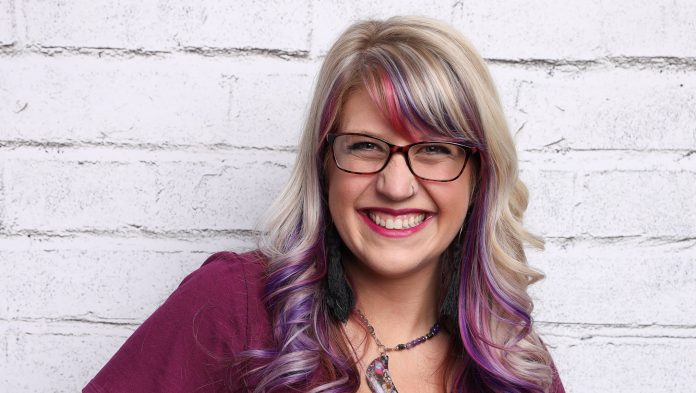Laura Rike is a social influencer, brand designer, and marketing strategist. She started her business to “help you succeed and show you how your business can have an impact on those you work with.”
For her business, Laura Rike helps “entrepreneurs and bloggers build their brand and increase sales through social influence, design and marketing automation.”
Likewise, Laura Rike believes that she was “put on this path to be able to show others how they can build their own successful empire without having to work a 9-5.” She wants to help people stay motivated to start their own business.
Laura Rike also believes that business competition is imaginary, since there are “only mentors, mentees, collaboration opportunities, and friends.” As she puts it, “There’s enough air for everybody to breathe.”
In the spirit of collaboration, Laura Rike says entrepreneurs should come together regularly to “talk, support, advise” one another in business. Entrepreneurs also deserve to “feel successful and happy with what they’re doing and be respected in the online world.”
Laura Rike also makes it a point to give back wholeheartedly to good causes and her local community. As a strategist, she also believes that Pinterest is a “sleeper tool” that more people should use for their business.
Check out more interviews with social media disruptors here.
I learned I could merge Pinterest marketing with graphic design, which was much more enjoyable for me. Laura Rike
Jerome Knyszewski: Thank you so much for joining us in this interview series! Before we dive in, our readers would love to “get to know you” a bit better. Can you tell us a bit about your ‘backstory’ and how you got started?
Laura Rike: I actually went to school for graphic design, but two years in, I decided to switch to marketing. I have a marketing/social media major with a graphic design minor degree. After doing some graphic design for a brick and mortar for a few years, I moved into an internship to grow my marketing experience. This helped me realize I could run a VA business from home while raising my kids. From there, I did an all in one virtual assisting business. I learned I could merge Pinterest marketing with graphic design, which was much more enjoyable for me. That was back when Pinterest was invite-only, a long time ago!
Jerome Knyszewski: What was the “Aha Moment” that led to the idea for your current company? Can you share that story with us?
Laura Rike: My aha moment was realizing I was doing too many things. I was too focused on bringing in an income that it was wearing me too thin. Every time I took on a client that was not Pinterest focused, I felt like I was giving away a piece of myself. My oldest son said to me one day that I was “always working”. That made me realize that wasn’t the goal for me when I decided to work from home. I wasn’t prioritizing the love of what I wanted to do and my family time. That moment pushed me to niching down to Pinterest.
One of the things that gave me the motivation to keep going was focusing on my family and their needs.
Jerome Knyszewski: Can you tell us a story about the hard times that you faced when you first started your journey? Did you ever consider giving up? Where did you get the drive to continue even though things were so hard?
Laura Rike: One of the times I felt like giving up was when I decided to only focus on Pinterest and started using that two letter word “no” to other people that wanted things outside of my zone of genius. It was really difficult for me. We were about to purchase a house and have a second child, so the pressure was on. It was hard to get out of my own way with my mindset, thinking that if I niched down to Pinterest, I would still be able to bring in enough money. It was a mindset issue I had to work on.
It was a healthy struggle that taught me a lot. I’m so glad I didn’t give in to covering “everything” for my clients. One of the things that gave me the motivation to keep going was focusing on my family and their needs. Also, to see ease of word of mouth online. When I niched down, it seemed like people had an easier time being able to recommend me for what I wanted to do. People started seeing me more easily as a Pinterest expert. Niching down was the most brilliant move for my business.
Jerome Knyszewski: So, how are things going today? How did your grit and resilience lead to your eventual success?
Laura Rike: Things are going amazing today. We hit our first year in 2020 at six figures at $250,000 in revenue! We have goals to grow that this year by double. The grit and resilience taught me how to be able to prepare and educate my team, to professionally develop them to push past some of those struggles so they didn’t have to go through them too.
Jerome Knyszewski: Can you share a story about the funniest mistake you made when you were first starting? Can you tell us what lessons or ‘takeaways’ you learned from that?
Laura Rike: I don’t know if I have a “funny” mistake, but one of the first mistakes I made in the beginning was trying to expand too quickly without even knowing what my full value stack was. I was grasping at straws to bring in income to expand my team. I learned to really get clear on what I wanted and how I wanted to deliver it to my clients. Instead of focusing on more, I focused on quality. Instead of focusing on hiring all the time, I focused on what absolutely needed to be done and what could be handed off. Also, what could be put on the backburner for further down the road.
Someone once asked me, “why should I invest in you if you don’t invest in yourself?”. That hit me hard. Laura Rike
Jerome Knyszewski: Ok super. Here is the main question of our interview. What are your “5 Things I Wish Someone Told Me Before I Began Leading My Company”? Please share a story or an example for each.
Laura Rike:
- Cash flow. I wish someone would have told me the amount of education and support I would need with cash flow management. We have always been a cash-positive business, which I’m very grateful for. But there’s a lot of things you don’t know or understand in terms of cash flow when you get started. Understanding how to manage it and to create budgets is so important when you’re getting started. For example, last year I set up a business checking called “tax fund”. We make sure that, every week, a percentage of the income we’re bringing in is being put aside for taxes at the end of the year.
- Activity in the business. Whether it’s marketing, sales calls, product development — the activity you do doesn’t equal growth all the time. You need to prioritize what days or hours or times you can spend on product development. What time will you spend on what will equal sales growth or lead growth? This made a huge difference in my weekly schedule so I could actually hit my growth goals. That way, you can cut out or outsource what isn’t revenue-generating to focus on what you need to focus on.
- Setting money goals. I’ve never been that person who’s sat down to do that, it’s felt strange for me. But a couple years ago, one of my business coaches said that they didn’t focus on income, they focused on people. By focusing on how many people I wanted to help, I was much more motivated than just turning a profit. Your focus should be more on solving a problem with your services — focusing on the individuals behind the dollars made a greater impact than just hitting a revenue goal.
- If you don’t hire a coach, it will take longer to get where you want. Someone once asked me, “why should I invest in you if you don’t invest in yourself?”. That hit me hard. You can have a group that helps you through your current business struggles and can be your sounding board. It’s almost like a safety net because you have someone to bounce ideas off of who knows what you’re going through. You can get the support you need. I wish someone would have told me this should be a priority. When I did finally make this step, I grew from $7,500 yearly to $280,000 yearly in three years. A lot of that growth was due to the investments I made in my coaches. I have a coach for my team and two for myself. It’s been instrumental for the growth of my company.
- You need to make sure that you are giving enough time for yourself to be able to do some personal development just as much as product development. Set aside enough time for leading your team and team development. Strategize time for all aspects of development for yourself and your business. It’s not all about sales. It’s about mindset and personal development as well.
Jerome Knyszewski: How can our readers further follow you online?
Laura Rike: You can find me on my website and on all of my social media channels @laurarike.
Jerome Knyszewski: This was very inspiring. Thank you so much for the time you spent with this!
You can also watch Laura in conversation here:





